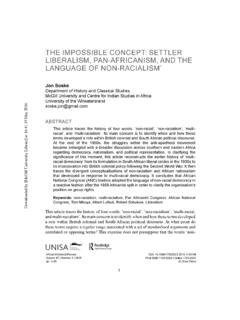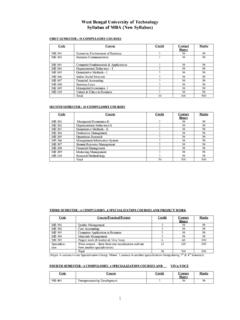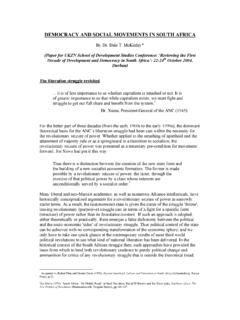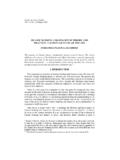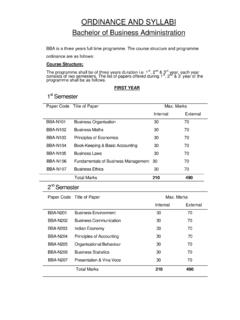Transcription of Leninist fantasies and SACP illusions
1 Leninist fantasies Leninist fantasies and sacp illusions : A response to Kitson and Slovo JONNY STEINBERG argues that marxism-leninism, because it theoretically determines the 'will of the masses, is fundamentally opposed to the sacp 's commitment to multi-party democracy In the last issue of WIP, Dave Kiison severely criticised the sacp for its deviation from the principles of marxism- leninism. He argued that the parliamentary democracy which the party advocates, 'the supersiruc-lurc on the base of a capitalist society.
2 Will not avoid the inexorable crises which are endemic to (WIP 73, p28). Parliamentary democracy, argues Kitson, must be abandoned for the classi-cal marxist notion of the dictatorship of the proletariat, the only conceivable 'superstructure' under which socialism can operate. I would be the first to agree that, de-spite its pronouncements to the contrary, theSACP has abandoned the cornerstones of leninism. Its principled allegiencc to multi-party democracy, to political plu-ralism, to the various 'bourgeois demo-cratic' forms so scathingly rejected by Lenin, place the sacp 's socialist pro-gramme in a conceptual amd theoretical contradiction to the model of revolution generated by classical marxism.
3 Rawed critique of capitalism Yet, unlike Kitson, I greet die party's af-firmation of so-called 'bourgeois demo-cratic forms' widi a sigh of relief. The post-capitalist political forms advocated by Lenin are rooted in a fundamentally flawed theory of capitalism, a theory which, if it is used as a guide to social transformation, will place South Africa dangerously close to reproducing the Stalinist legacy. Kitson reprimands Slovo for complain-ing that'there was not enough inclassical Marxist theory about the transition period to provide a detailed guide to the future' (Slovo, lias Socialism Failed?)
4 , cited in Kiison p2S). Kitson is at pains to illustrate that neither Marx nor Lenin predicted the future. What Marx did do, he continues, was to uncover a 'scientific' critique of the capitalist mode of production, a cri-tique accurate enough to outline the only Conditions of possibility for the destruc-tion of capitalism and the birth of a social-ist order. Here again I must wholeheartedly agree widi Kitson. Every line and concept of Lenin's 'The State and Revolution' (the only text in which Lenin coherently spell out his theory of revolution and of post-revolutionary society) draws iis inspira-tion from Marx's critique of die capitalist mode of production.
5 If one has gripes with the classical marxian concept of proletarian revolution, it would be non-sensical to point to insufficient writings on the subject, as Slovo does. Rather, one should look to the conceptual basis upon which the notion of proletarian revolu-tion and proletarian dictatorship arose; namely, the marxist-lcninist critique of capitalism. It is here that my argument against Kitson arises. The state as an instrument of dictatorship In Lenin' s analysis of the bourgeois state, he insisted that itoughtto be 'smashed' so as to unleash real subsianti vc democracy.
6 For Lenin the very existence of any state is a function of class domination: 'The state is a product and a manifesta-tion of the irrcconcilibility of class an-tagonisms. The state arises where, when and insofar as class antagonisms cannot be reconcilcd.'(1975, p3l4). The very separation of the polity from the economy, the division of labour which places some agents exclusively in the political sphere and the majority of agents exclusively in the economic sphere, is for Lenin, a product of class society and a function of class dictatorship.
7 Al the heart of capitalism, argues Lenin, is the bourgeoisie's expropriation of wealth created by the proletariat. Yet the repro-duction of the modeof production founded on the exploitation of one class by an-other requires political power. If capitalism is to reproduce itself it requires an instrument of coercion which is separate from and out of the reach of the masses. Hence, the separation of the pol-WIP 74 Page 29 DEBATING SOCIALIST STRATEGY ily from the economy, hence the birth of the bourgeois state, a specialised instru-ment of coercion, separate from civil so-ciety and outside of the grasp of civil so-ciety.
8 It is important to note that for Lenin, the reshuffling of agents within die exist-ing state apparatuses is not sufficient for democrat! sation. The very perpetuation of a specialised instrument of coercion which operates above society is an im-pediment to democracy. Hence, the working class's strategic utilisation of its access to parliament is not a viable road to socialism. Here Lenin is very explicit: 'Todecidc once every few years which member of the ruling class is to repress and crush the people through parliament - this is the real essence of bourgeois '(l975, p342).
9 Indeed, Lenin argues, 'Capital establishes its power, so securely, so firmly, that no change of in the bour-geois-democratic republic can shake it' (1975, p319). What is required by the proletariat to destroy the private expropriation of wealth, to destroy capitalist relations of production, argues marxism-leninism, is political power. And to obtain political power, the proletariat must smash the bourgeoisie's instrument of power, namely, the capitalist state. In smashing the suite as an instrument which operates above society the prole-tariat must destroy all the cornerstones of representative democracy, and replace them with forms of 'direct democracy'.
10 Of political panics, the separation of die judiciary from the executive, all the functions of the repre-sentative state, must be destroyed. They are to be replaced by formsof administra-tion which are rooted wimin die fabric of civil society, under the direct control of each and every ordinary working person. These are the political forms of die marxist-leninistdictatorshipof die prole-tariat, 'the political forms at last discov-ered for the economic emancipation of labour' (Marx, "The Civil War in France', part ni).


